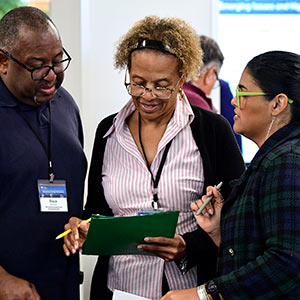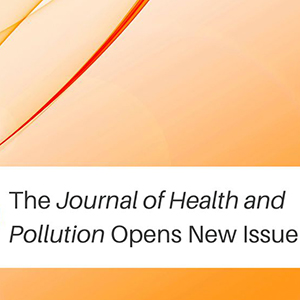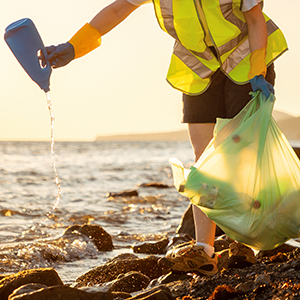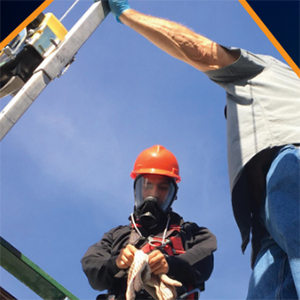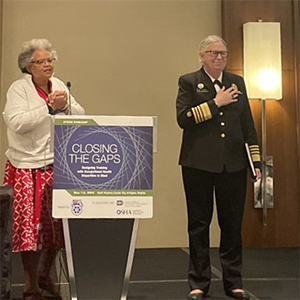The National Brownfields Training Conference in Oklahoma City provided an opportunity for the NIEHS Environmental Career Worker Training Program (ECWTP) to showcase its grantees, review progress, and discuss next steps of the White House’s Justice40 initiative, Aug. 17. (See first sidebar for more on brownfields.)
Justice40 guides federal agencies to deliver 40% of the overall benefits of investments in climate change, clean energy, affordable housing, clean water, workforce development, and pollution remediation to disadvantaged communities.
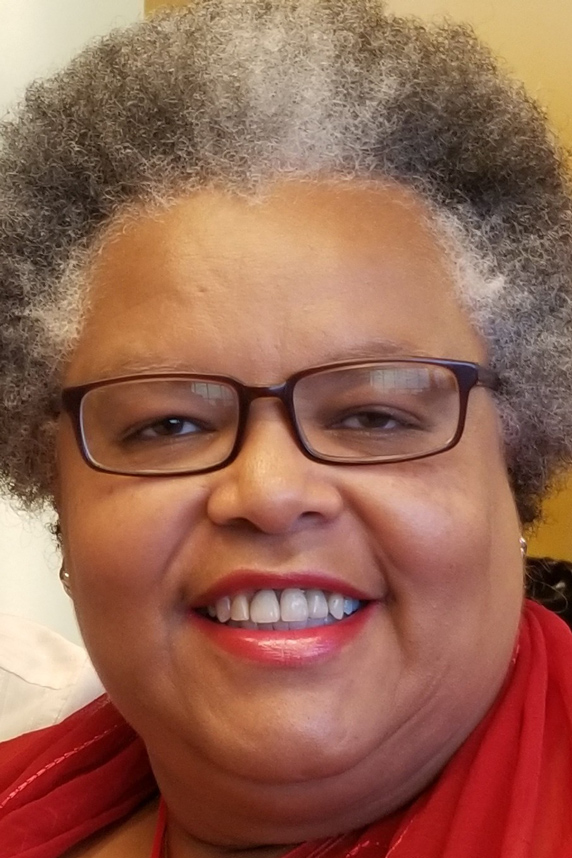 Beard shared information about ECWTP and details of its participation in the new Justice40 Initiative. (Photo courtesy of Sharon Beard)
Beard shared information about ECWTP and details of its participation in the new Justice40 Initiative. (Photo courtesy of Sharon Beard)ECWTP is a unique training program within the NIEHS Worker Training Program. The Brownfields 2022 meeting came two months after ECWTP was selected to participate in Justice40. Funding for ECWTP came with $4.25 million in support, with a focus on key Justice40 training goals.
“I'm delighted that we are able to provide grantees with new funding,” said Sharon Beard, director of the NIEHS Worker Training Program. “They can expand recruitment and training and also bring in new partners.”
The People’s Choice
During the conference, ECWTP received the “People’s Choice Award” for a poster presentation titled “A Justice40 Pilot and Workforce Development Model to Address Environmental Justice and Climate Change.”
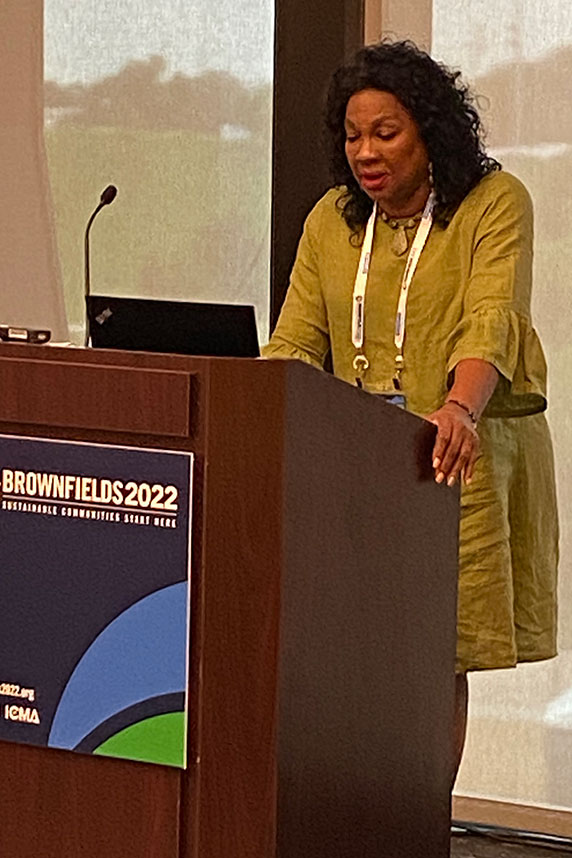 “I think the NIEHS Environmental Career Worker Training Program is the model program for Justice40,” Wright said. (Photo courtesy of Sharon Beard)
“I think the NIEHS Environmental Career Worker Training Program is the model program for Justice40,” Wright said. (Photo courtesy of Sharon Beard)“ECWTP has been instrumental in training workers on how to best protect themselves, their families, and their communities, not only on their jobs, but also during and after climate-related disasters and health emergencies,” the poster stated, highlighting how the program will continue its success in the Justice40 Initiative.
Race and pollution
Representatives of ECWTP grantee organizations were there to speak about their work, the potential benefits of Justice40, and what the new financial support would mean.
Beverly Wright, Ph.D., executive director of the Deep South Center for Environmental Justice (DSCEJ), noted that Justice40 takes a whole-of-government approach to addressing pollution and environmental injustice.
“Most of our problems can’t be fixed by one agency,” she told attendees.
Robert Bullard, Ph.D., is the director of the Bullard Center for Environmental and Climate Justice at Texas Southern University. He and Wright are both members of the White House Environmental Justice Advisory Council. They also co-direct the Historically Black Colleges and Universities Consortium, a longtime ECWTP grantee.
Bullard discussed the need to improve the Climate and Economic Justice Screening Tool, a geospatial mapping tool created by the Council on Environmental Quality to identify areas of need and where Justice40 benefits can best be directed.
“The tool rolled out in beta form without factoring in race,” he said. “The Bullard Center and Deep South are working on a supplemental tool that will overlay race.”
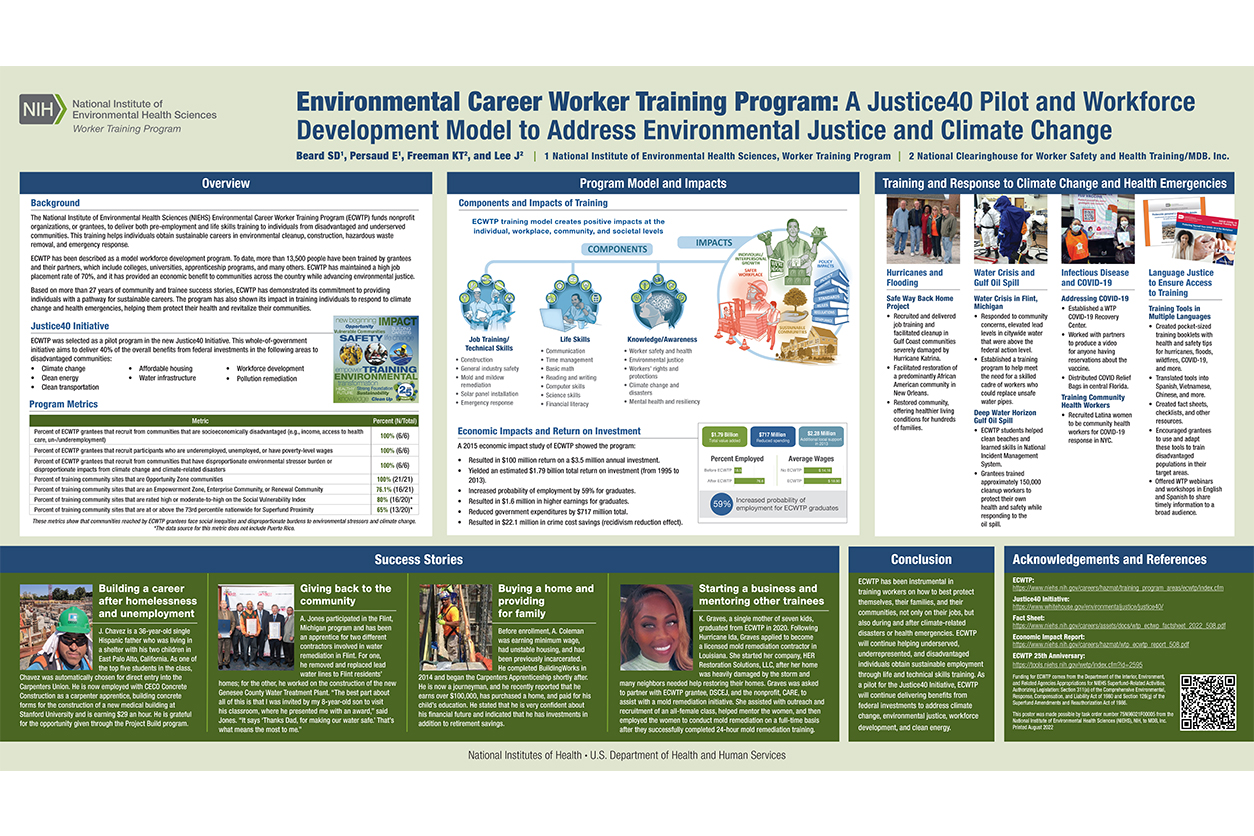 The ECWTP poster won the “People’s Choice Award” at the Brownfields conference. (Image courtesy of ECWTP)
The ECWTP poster won the “People’s Choice Award” at the Brownfields conference. (Image courtesy of ECWTP) New opportunities to expand
David Casavant is the founder of the Sustainable Workplace Alliance (SWA), a recent ECWTP grantee that provides training and job placement in environmental health and safety careers. Justice40 will make it possible for SWA to offer new programs in Puerto Rico.
New services were also on the agenda for Montgomery Proffit, director of the ECWTP at Opportunity, Advancement, and Innovation in Workforce Development (OAI), which works with employers primarily in the Midwest. “The Justice40 Initiative makes it possible to extend our training and services to St. Louis,” Proffit said.
Steve Surtees, director of ECWTP at the Center for Construction Research and Training (CPWR), works closely with building trades unions. “Our goal is to place more graduates from our programs into a registered apprenticeship with one of the local buildings trade unions,” he said.
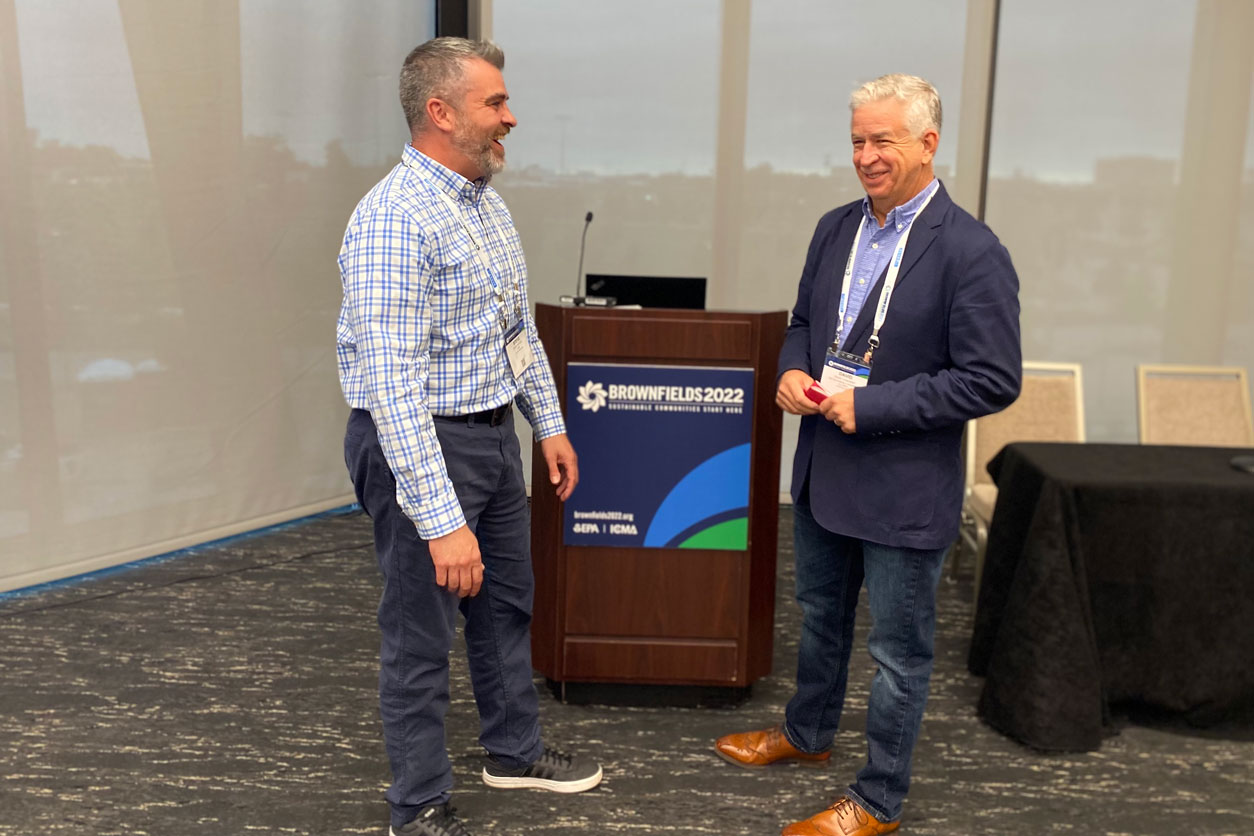 Surtees, left, and Casavant, right, share stories following the meeting. (Photo courtesy of Kenda Freeman)
Surtees, left, and Casavant, right, share stories following the meeting. (Photo courtesy of Kenda Freeman)Training workers, helping communities
Monica Villalba is a facilitator for the community health worker training program at Make the Road New York, which provides job training for mostly immigrants. Justice40, she said, will make it possible to enroll more students and help raise community living standards.
Yodit Semu, ECWTP coordinator for Western Region Universities Consortium (WRUC), also discussed the benefits of Justice40. “It will fund additional mentorship and career guidance, basic math, basic reading, first aid, and CPR training for Women in Non Traditional Employment Roles [WINTER] in Los Angeles,” she said.
WRUC also provides training programs in Alaska that make it possible for participants from remote communities to travel to Anchorage to learn trades on a schedule that does not disrupt their traditional ways of life.
“Subsistence living activities are seasonal,” said Semu. “We try to make it possible for [participants] to travel for training and return to their communities to support their families.”
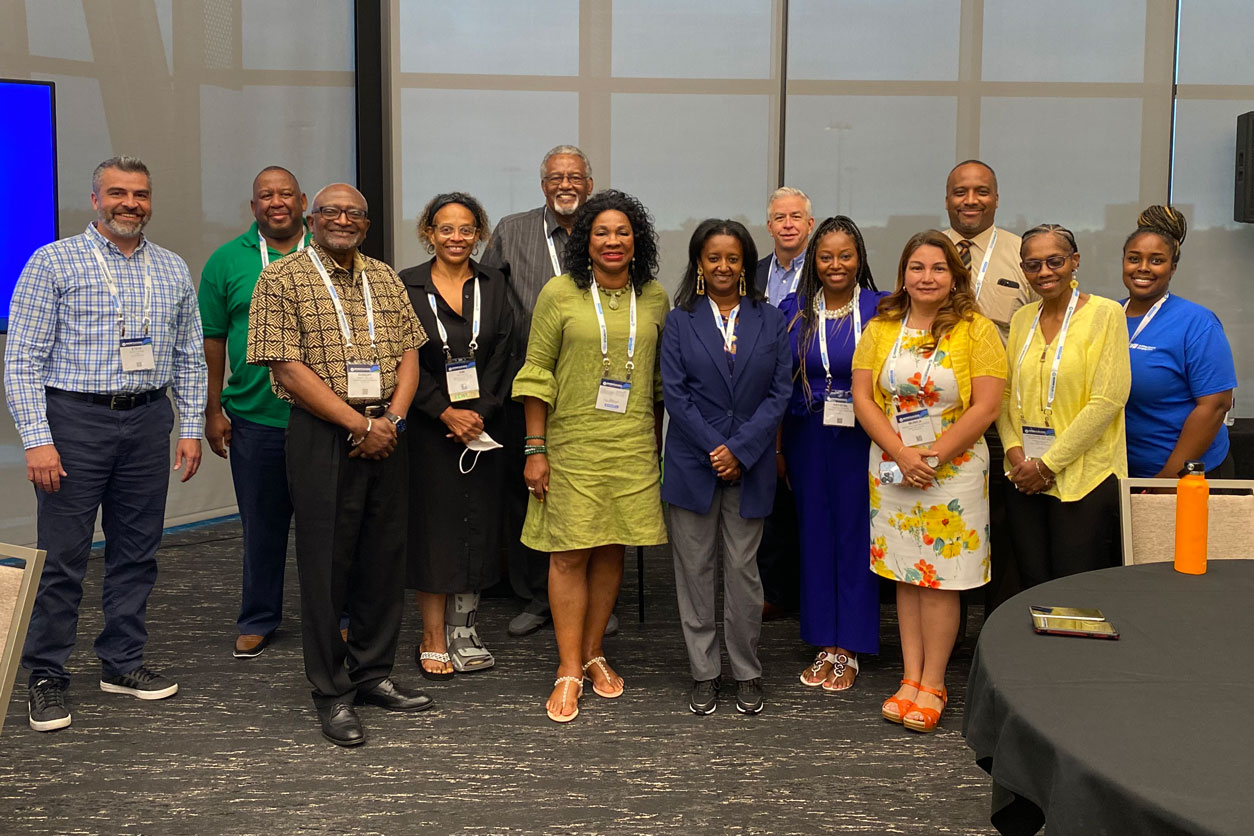 From left to right: Surtees; Bruce McClue, DSCEJ; Bullard; Kim Dunn Chapital, DSCEJ; Calvin Avant, Ph.D., Unity in the Family Ministry; Wright; Semu; Casavant; Krystal Pree Hepburn, OAI; Villalba; Proffit; Paula Grady, OAI; Kentina Kellum, OAI. (Photo courtesy of Kenda Freeman)
From left to right: Surtees; Bruce McClue, DSCEJ; Bullard; Kim Dunn Chapital, DSCEJ; Calvin Avant, Ph.D., Unity in the Family Ministry; Wright; Semu; Casavant; Krystal Pree Hepburn, OAI; Villalba; Proffit; Paula Grady, OAI; Kentina Kellum, OAI. (Photo courtesy of Kenda Freeman)(John Yewell is a contract writer for the NIEHS Office of Communications and Public Liaison.)





